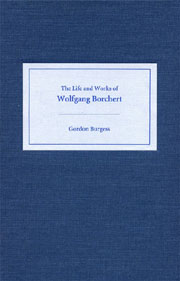Book contents
- Frontmatter
- Contents
- Acknowledgments
- List of Abbreviations
- Introduction
- 1 Childhood, School, Apprenticeship: 1921–1940
- 2 “The Happiest Time of My Life': January–June 1941
- 3 The Eastern Front and Courts-Martial: 1941–1943
- 4 Actor Turned Writer: Jena, Hamburg, and Basel: 1944–1947
- 5 The Poems
- 6 Draussen vor der Tür
- 7 The Short Stories
- 8 The Reception of Borchert's Life and Works
- Conclusion
- Published Works Cited
- Index
2 - “The Happiest Time of My Life': January–June 1941
Published online by Cambridge University Press: 05 February 2013
- Frontmatter
- Contents
- Acknowledgments
- List of Abbreviations
- Introduction
- 1 Childhood, School, Apprenticeship: 1921–1940
- 2 “The Happiest Time of My Life': January–June 1941
- 3 The Eastern Front and Courts-Martial: 1941–1943
- 4 Actor Turned Writer: Jena, Hamburg, and Basel: 1944–1947
- 5 The Poems
- 6 Draussen vor der Tür
- 7 The Short Stories
- 8 The Reception of Borchert's Life and Works
- Conclusion
- Published Works Cited
- Index
Summary
January– March: Jobless and Rebellious
BY THE END OF 1940, the life of the nineteen-year-old Borchert had not been exactly crowned with success. He had left school with a poor report and low grades. He had left his job as a bookshop assistant without gaining any qualification in the trade, despite being almost at the end of his apprenticeship, solely in order to concentrate on his acting examination before the board of the Reichstheaterkammer. He had written a play with Günter Mackenthun that they both regarded as a work of genius and sent off to the leading actor of the day, Gustaf Gründgens, probably without getting even the courtesy of an acknowledgment. And he had been arrested and beaten up by the Gestapo, knew that he was being followed, and knew too that his letters were being intercepted and opened by the authorities who left their stamp on them as proof and warning: “Gestapo.”
Life at home was not always easy, either. His relations with his parents were often strained. In her memoirs about this period, his mother repeatedly comments that things were difficult with him, and that he was living in a state of discord. He brought friends home, where they would attack their parents' generation for providing, as they put it, the dung that allowed a Hitler to grow and flourish. In the main, his parents took such attacks in their stride, either not reacting or only warning their son.
- Type
- Chapter
- Information
- The Life and Works of Wolfgang Borchert , pp. 44 - 56Publisher: Boydell & BrewerPrint publication year: 2003

